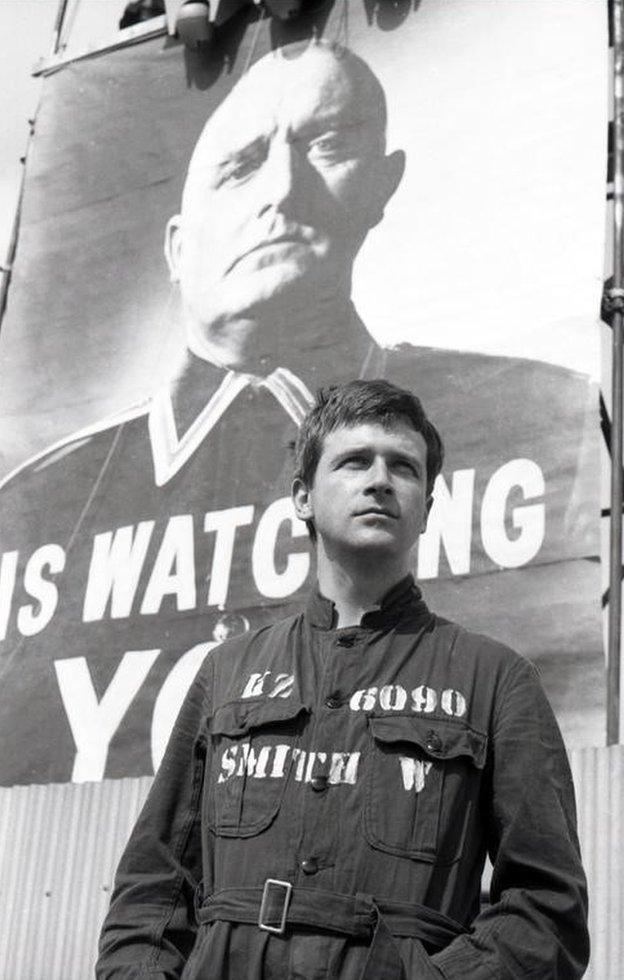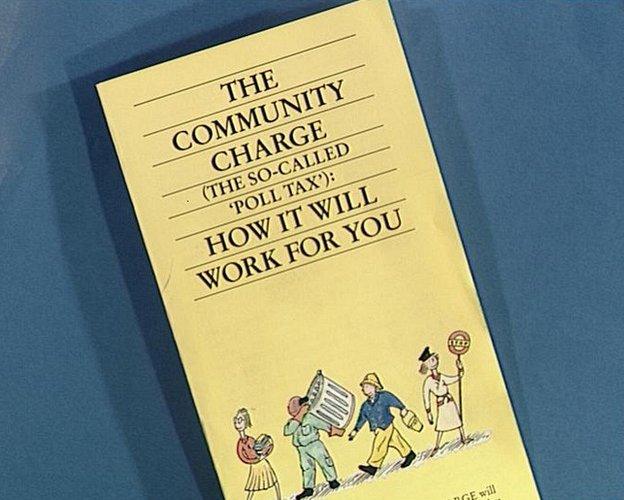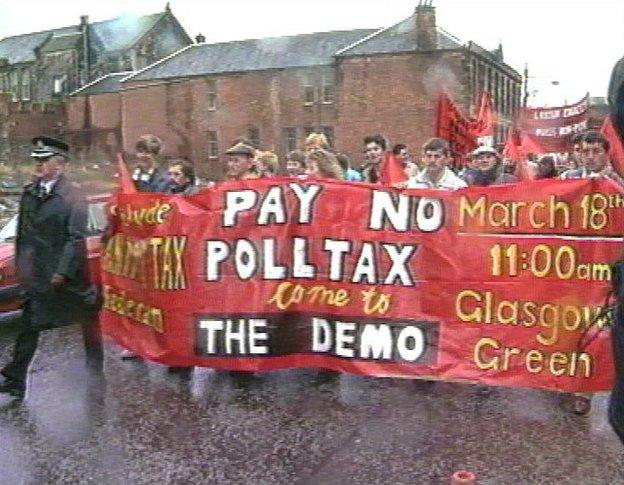Taking a turn for the Orwellian?
- Published

Has first minister's questions taken a turn for the Orwellian?
Perhaps it is post referendum ennui, perhaps it is the stimulating sight of the mighty United at the top of the league - but a curious detachment crept up on me during questions to the first minister.
Some vague recollection kept scratching at the pitiful remains of my cerebrum, laid waste by endless months of political argument.
What was it? Before me, perfectly legitimate - indeed vital - discussions about Scotland's health service.
Johann Lamont spoke of cuts to come. Ruth Davidson referred to a report by the institute for Fiscal Studies questioning the level of NHS spending in Scotland.
Alex Salmond rebutted both. Statistic piled upon statistic. Quotas, percentages, targets, up, down. Just what was that thought invading my consciousness?
"The NHS budget will continue to increase in real terms". "But what about the IFS?" "Just look to Wales, see what's happening there." Finally, I remembered.
That surfacing recollection was a passage from George Orwell's "1984". Winston Smith was pursuing his daily task of rewriting past records to make them match the out-turn.
That day's endeavour concerned the production of boots.
Orwell writes: "The Ministry of Plenty's forecast had estimated the output of boots for the quarter at 145 million pairs. The actual output was given as sixty-two millions. Winston, however, in rewriting the forecast, marked the figure down to fifty-seven millions, so as to allow for the usual claim that the quota had been overfulfilled."
Then anarchic notions, verging on Thoughtcrime, penetrate Winston's consciousness. "In any case, sixty-two millions was no nearer the truth than fifty-seven millions, or than 145 millions. Very likely no boots had been produced at all. Likelier still, nobody knew how many had been produced, much less cared."
The entire exercise, Winston concludes, was "merely the substitution of one piece of nonsense for another." (And, yes, I am well aware of one claimed model for Winston's workplace.)
Chronic pain
To stress again, the points raised by both Ms Lamont and Ms Davidson were valid, even crucial.
Had sufficient funds been diverted to the NHS? Had all the relevant consequentials from spending in England been routed to health?
However, I could not help thinking about the apparent mismatch between this form of debate and the practical delivery of health care to patients - which may be as much about management and morale as it is about money. Although money undoubtedly helps.
How little, I thought, it would mean to a mother awaiting treatment for her child? How little to a citizen enduring chronic pain? How little, also, to a grateful family whose Dad has received wonderful support?
Parliamentary politics - with its constraints of time, procedure and partisan loyalties - can be a somewhat clumsy mechanism for reflecting the real, everyday concerns of people.
It is however, as another Winston noted, rather better than the alternatives.

Mr Salmond announced action against chasing unpaid poll tax

Today at Holyrood we had two further examples of the genre. The Presiding Officer, Tricia Marwick, allowed several MSPs to intervene on a tabled question about the carrying of guns by Scotland's police officers.
Labour's Graeme Pearson - a former police chief - responded acerbically to a suggestion from the first minister that his past views on the subject sat ill with views expressed by his party colleagues.
There was a thoughtful contribution from Alison McInnes of the Liberal Democrats - who noted that the real issue was that of accountability by the chief constable of Police Scotland. To whom? How?
At all points, Mr Salmond defended the actions of the police - and argued that the outcome, restraining the deployment of guns, sat with public opinion.
It meant, he argued, the system was working, not fractured. These were substantive exchanges, facilitated by the chair.
Media attention
Rather blunter in that respect was Willie Rennie, who leads the Lib Dems. The guns controversy, he said, should end the career of the Justice Secretary Kenny MacAskill.
As said minister sat, solemn and sad, on the front bench, Mr Rennie suggested the first minister might take Mr MacAskill with him when he left office.
Mr Salmond declined, noting that his colleague had presided over a record cut in crime.
Perhaps the first minister had anticipated a tough time over this issue - and possibly health.
In any event, he opted to open proceedings by announcing that his government would legislate to prevent councils from pursuing historic poll tax debts.
It was big news, a significant development - and one which the presiding officer reckoned merited a full statement rather than an aside. She was plainly less than pleased.
Mr Salmond, however, will feel justified in seizing upon an issue which has drawn media attention of late.
He argued that it was time to put the poll tax to bed once and for all.